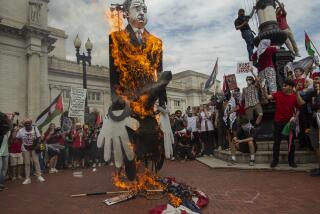Beating Pinochet at His Own Game : By Mobilizing Now, Chileans Can Say ‘No’ at Plebiscite
- Share via
Gen. Augusto Pinochet loves power. He has ruled Chile with an iron hand since Sept. 11, 1973, and he intends to continue in power for many more years, even if it means pushing his country to the edge of disintegration.
In recent months there has been increased repression of dissidence, particularly in the media. All of the directors of opposition publications are on trial for vaguely defined “crimes against public order.” Several of them were jailed before being tried.
Sometime before next February, possibly as soon as September, Chile will vote on extending Pinochet’s term. But the general does not intend this to be an exercise in democracy. The voting will be a plebiscite that provides only for a “yes” or “no” vote on a single candidate. Since the candidate will have been formally selected by the commanders of the armed forces, it most likely will be Pinochet.
According to the procedures established in the Constitution (imposed in 1980, and itself an anti-democratic document), if Pinochet wins the plebiscite he will be entitled to rule Chile until 1997, when, health permitting, he will be eligible for yet another eight-year term. If Pinochet loses, he will be allowed to remain in power for at least one full year, until competitive elections are held for president and the legislature. Even then, Pinochet would be able to designate one-third of the Senate, continue as commander-in-chief of the army and control the National Security Council, a new body which is endowed with virtual veto power over any political action that is judged to “endanger national security.”
What can the opposition do in these circumstances? Some dissident forces, particularly the Communist Party, argue that Pinochet would not hold the plebiscite unless he was sure of winning, and that no dictatorship ever loses a referendum. Hence, the argument goes, the democratic forces should not legitimize the plebiscite by participating in it; instead, they should confront the dictatorship with various forms of mass struggle, including armed violence.
It is not true, of course, that dictatorships never lose plebiscites. The Uruguayan military government lost one in 1980, and the Jaruzelski regime in Poland lost another in 1987.
As for violent struggle against Pinochet, it may be emotionally attractive for some, but it would have enormous human costs, and is almost certainly unfeasible, having already proven to be a divisive issue within the Chilean opposition. Moreover, violent actions would be welcomed by Pinochet, who is particularly skillful in war-type situations, since it would give him a gratuitous argument to justify widespread repression.
The preferred alternative for those who want a return to democracy is to mobilize actively in order to defeat Pinochet at his own game. Already, a drive is under way to register at least 6.5 million voters, so that the plebiscite will accurately reflect the views of Chile’s public. The opposition will have to organize throughout the entire country to get a representative “no” vote in the plebiscite and to safeguard against fraud in the voting process.
Some in the Chilean opposition have created a “Party for Democracy” for this effect, while others are organizing as ideological parties for similar purposes. Most important, 13 opposition political parties signed an agreement last month to implement a unitary campaign for the “no” vote. The signers of the accord represent a wide spectrum, ranging from the two major Socialist parties to the small right-wing Liberal-Republican Union, and including the highly significant Christian Democratic Party.
But the democratic forces must not participate in the plebiscite unless some basic conditions are met. As outlined by the Chilean Catholic Bishops Conference, these include freedom of expression, freedom of assembly and access to television. Finally, whatever the results of the plebiscite, Chileans should persevere in the peaceful struggle for free elections and a substantial reform of the 1980 Constitution.
What can the United States do to promote democracy in Chile? Washington should put Chile high on its foreign-policy agenda, rather than letting it slip from attention until the next crisis arises. And the United States should lend sympathetic support to the opposition. A step in the right direction was the declaration made in the name of President Reagan and Secretary of State George P. Shultz in December, which emphasized the conditions that should precede any free electoral process in Chile.
In the past the Reagan Administration maintained very cordial relations with Pinochet and showed little interest in stimulating change toward political freedom in Chile. More recently, however, the Administration has openly criticized the repressive actions of the military government, and in December it even applied some economic pressures against the regime.
One may reasonably suspect that this policy shift is too little and too late to make a difference. Multilateral lending institutions have already given Pinochet all the money he needs to reactivate the Chilean economy before the plebiscite and to continue the quasi-populist electoral campaign he initiated months ago. Furthermore, the Pinochet regime is quite confident that in Washington there is no consensus for a tougher policy on a country that practices conservative economics and is located so far on the fringe of the present Latin American policy focus.
In any case the future of Chile will be decided by the Chilean people; U.S. intervention is unacceptable and, as Chileans themselves saw in the overthrow of Salvador Allende in 1973, often leads to undesired outcomes.
But international solidarity to promote human rights and democracy is both acceptable and necessary. This will become particularly evident as the time nears for Chileans to vote.
More to Read
Sign up for Essential California
The most important California stories and recommendations in your inbox every morning.
You may occasionally receive promotional content from the Los Angeles Times.













